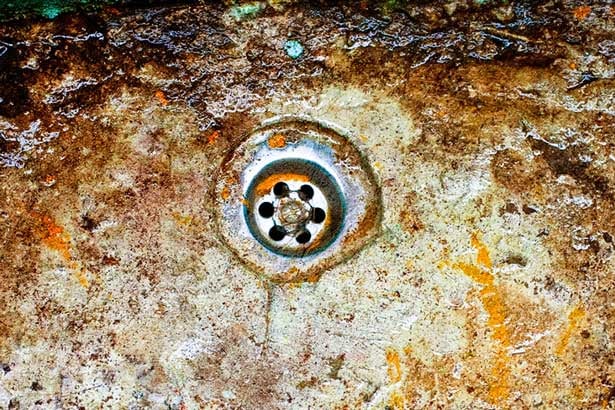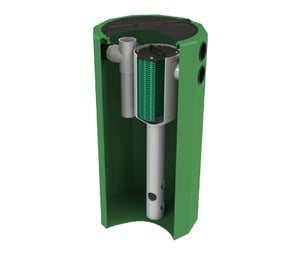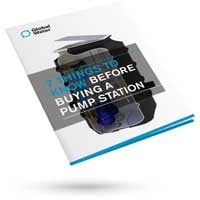Do you own a café? Or maybe a restaurant? If so, there are certain commercial food preparation and service requirements to adhere to when it comes to trade waste disposal.

Above: Trade waste disposal down a sink. Image credit: Bundaberg Regional Council
Trade waste is any used water and substances from commercial business trade, or manufacturing activities that are discharged to our sewerage system for removal or treatment (SA Water, 2020).
In order to maintain local infrastructure, pipework and other assets, SA Water advise of critical guidelines for discharge of food waste.
As you learn of the local requirements for trade waste disposal, begin by asking yourself the following:
- What waste could enter the waterways from my café / restaurant?
Does the water include high levels of grease? If so, screening and grease arrestors will be required to remove larger solids, grease and oil from the water before it enters the drainage system.
- Do I need to consider a pre-treatment device?
Most sites under SA Water’s Commercial Food Preparation & Services category require a pre-treatment device. These act to reduce containment levels in wastewater, from kitchens, bin wash areas, so it is suitable to enter the sewer system.
If there are significant levels of suspended solids and oil/grease, SA Water advise of a screen to remove larger suspended solids, followed by a grease arrestor.
SA Water highlights the minimum pre-treatment requirements for those within this category.
Requirements for trade waste disposal from SA Water
Removing large solids
In order to remove large solids, you are required to install screening. Screening devices include:
- Waste strainer basket (maximum 3 mm holes) with fixed secondary strainer (max 3mm holes) installed at the sink outlet.
- Floor waste fittings with a water seal in the work area fitted with a strainer basket (max 3mm holes) and a fixed secondary strainer (max 3mm holes).
- Wastewater discharging from sink outlets to a floor waste fitting with a water seal discharge over a fitted strainer basket (maximum 3 mm holes) and a fixed secondary strainer (max 3 mm holes)
- Strainer baskets are emptied into a solid waste bin daily or more often to avoid blockage and odours.
These screening devices are generally pre-installed in sinks and floors - however check their presence before operating.
Removing Oil/Grease and to moderate temperature
Grease Arrestors are capable of dramatically reducing the grease content of the discharge through either stokes law or microbiological activity. They would be installed as a pre-treatment device, before the waste enters the sewer system.
For SA Water approved grease arrestors, the following requirements apply for the Commercial Food Preparation & Service category:
- Minimum hydraulic capacity equivalent to discharges from one hour of peak use - additional capacity may be required
- Minimum capacity for any arrestor is 1,000 L
- New developments without comprehension of the type of future food preparation/service tenancies, SA Water specifies a minimum arrestor capacity of 2,400L for stand-alone tenancies and 1,500 L for tenancies sharing a pre-treatment device (for example, food courts) (SA Water, 2019).
What does this mean for me? What sort of responsibilities do I have after I purchase a grease arrestor?
Accumulated oil, grease and settling solids reduce the arrestor’s ability to work at full capacity. Therefore, it’s important to consider introducing best practice for staff through the following:
- Place all spoiled foods and scraps from preparation or customer’s plates in the bin before washing up
- Set cooking oil aside for separate disposal - store it in a bunded area so it cannot accidentally enter the sewer or stormwater drains.
- Turn off taps when not in use
- Wait for a full load before using the dishwasher
- Sweep or mop the floor instead of hosing it down
The periodic removal of accumulated waste is crucial in ensuring the effectiveness of the grease arrestor.
SA Water establishes a maintenance schedule which ensures correct operation of the grease arrestor. Depending on the waste accumulation rate, the compliance audit will vary from fortnightly to annually.
Accumulated wastes are removed by a licensed liquid waste contractor.
Selecting a Grease Arrestor
SA Water provide a list of Approved Basic Trade Waste Pre-Treatment Products suitable for Commercial Food Preparation & Services categories. These are the only grease arrestors approved for use in South Australia - for interstate options it’s important you refer to your local water authority.
 Global Water (Global Pumps) is one of SA’s leading Grease Arrestor providers. Our product has SA Water approval, guaranteeing the quality and reliability of the Grease Muncher. It was been approved as a basic pre-treatment device, suitable for connection to the sewerage system. For a full list of approved grease arrestors, click here.
Global Water (Global Pumps) is one of SA’s leading Grease Arrestor providers. Our product has SA Water approval, guaranteeing the quality and reliability of the Grease Muncher. It was been approved as a basic pre-treatment device, suitable for connection to the sewerage system. For a full list of approved grease arrestors, click here.
The GM700 is a lightweight compact grease arrestor suited to small or temporary installations, such as leased premises. It’s manufactured to last, constructed in polyethylene and thermal plastics to promise long life, durability and maximum corrosion resistance. Suitable for above or below ground free-standing installation, the Grease Muncher successfully reduces grease content of the discharge through microbiological activity.
Global Water are in South Australia and work closely with SA Water to offer versatile trade waste advice solutions. For more information on Global Water’s Grease Muncher, or to chat to a team member about your trade waste requirements, give us a call.
**Disclaimer: If you're outside of South Australia, it is advised you seek advice from your local water authority. Requirements may differ from SA Water's recommendations.
Tags: Wastewater, Stormwater




